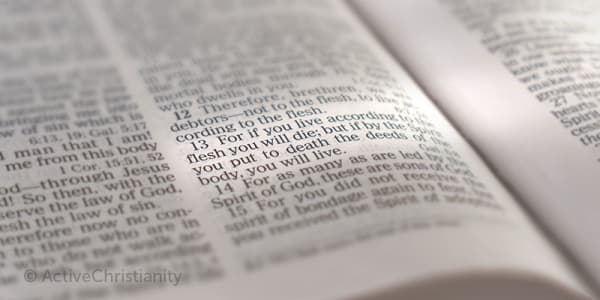Learn more about ActiveChristianity, or explore our theme pages for more

What does it mean to put to death the deeds of the body?
To put to death the deeds of the body we have to first understand what they are, and how they differ from living according to the flesh.

“For if you live according to the flesh you will die; but if by the Spirit you put to death the deeds of the body, you will live.” Romans 8:13.
There is a lot to take in and understand in that one verse. What does it mean to live according to the flesh? What does it mean to put to death the deeds of the body? This is important to know, as the verse clearly states that if we do that, we will live!
To live according to the flesh is the same as consciously fulfilling the lust of the flesh (Galatians 5:16) or giving in when tempted by the desires of the flesh. (James 1:14-15) It is consciously committing sin, transgressing the law, breaking those laws of God which you knew beforehand.
Works of the flesh
Works of the flesh are things we know to be sin before we do them. If we continue to live according to the flesh, that is, to live in sin, then we will die. If we do not live according to the flesh, then we have crucified the flesh with its passions and desires. (Galatians 5:24) Then we are crucified to everything we know to be sin. In other words, when we are tempted to sin, we don’t give in to it. Of course this doesn’t mean that our lust to sin disappears by itself; but it is an attitude of mind that requires us to fight the good fight to overcome sin, and this will involve suffering as the flesh is denied satisfaction for its lusts and desires.
“Likewise you also, reckon yourselves to be dead indeed to sin, but alive to God in Christ Jesus our Lord. Therefore, do not let sin reign in your mortal body, that you should obey it in its lusts.” Romans 6:11-12.
“Therefore, since Christ suffered for us in the flesh, arm yourselves also with the same mind, for he who has suffered in the flesh has ceased from sin, that he no longer should live the rest of his time in the flesh for the lusts of men, but for the will of God. 1 Peter 4:1-2.
Like what you’re reading?
Deeds of the body
Even more significantly, it is written that if we put to death the deeds of the body by the Spirit, we will live! (Romans 8:13) So what then are the deeds of the body, and how do they differ from the works of the flesh? (Galatians 5:19-21) Deeds of the body are things we realize are wrong only after we have done them, because the Holy Spirit points them out to us—we receive new light that they were wrong. Therefore, anything wrong that we do unconsciously—without our mind or our enlightened self agreeing to it—is a deed of the body. There is no condemnation for these deeds of the body when we accept the light and judge these deeds by the Spirit and thus conquer them. (Romans 7:25 and Romans 8:1-2)
Two things are necessary in order to “live;” to follow Christ:
- That I no longer live according to the flesh, so that the works of the flesh cease. In other words: I no longer do what I know to be wrong. (1 Peter 4:1-2)
- That the deeds of the body are put to death (judged, forsaken) one by one as they come to light. In other words: I stop doing things when new light reveals them to be wrong. (Romans 8:13; 1 John 1:6-8)
To put to death
We cannot hate—or crucify—things we do not know to be wrong. Crucifixion cannot extend any further than the light we have. However, it can and should work that far. To put sin to death—either a work of the flesh or a deed of the body (which is put to death after the fact) you must:
- Judge it—acknowledge the truth; see it as sin.
- Hate it—see sin as exceedingly sinful (Romans 7:13) (Click here to read about learning to see sin as God sees it.)
- Do not practice it—deny the temptation, and refuse to agree to sin once you have light about it. This is possible through the power the Holy Spirit supplies to those who are obedient.
If you do this, then sin will not merely be suppressed, but it will actually die. Through faith and patience you will in the end no longer even be tempted to that sin. This is the divine nature that we have been called to and promised. (James 1:13-14; 2 Peter 1:3-4; 2 Corinthians 3:18)
“Beloved, now we are children of God; and it has not yet been revealed what we shall be, but we know that when He is revealed, we shall be like Him, for we shall see Him as He is. And everyone who has this hope in Him purifies himself, just as He is pure.” 1 John 3:2-3.
Scripture taken from the New King James Version®, unless otherwise specified. Copyright © 1982 by Thomas Nelson. Used by permission. All rights reserved.



